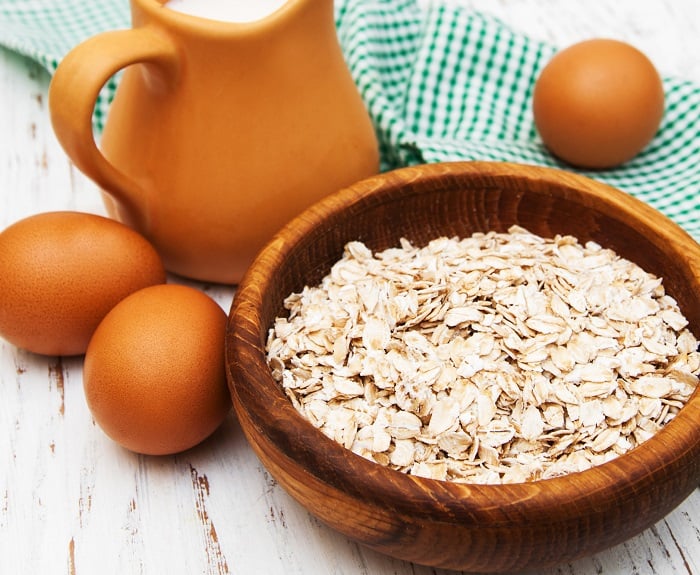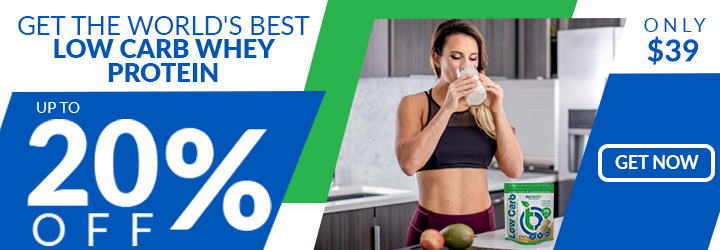Oatmeal or Eggs for Breakfast: What’s Better?

-David
A: This is a great question, David! When it comes to healthy eating, I think a lot of us have had similar debates, and oatmeal or eggs for breakfast is a classic example. You can certainly find people on both sides passionately quarreling when it comes to which one makes a better breakfast.
For years, of course, eggs were wrongly vilified due to their fat and cholesterol content. But that debate appears to have been put to rest. We now know, for instance, that fat doesn’t make you fat, and some is quite necessary for optimal health. We also know that dietary cholesterol has little to nothing to do with blood cholesterol, which serves many vital functions.
Now the dietary pendulum has swung the other direction, and carbohydrates of all kinds—even those from nutrient-dense, fiber-rich whole foods—are being maligned (often inappropriately so). (Though, of course, processed foods high in added sugar and stripped of nutrients are worth avoiding.) But we’ll leave that argument for another day.
Is Breakfast REALLY the Most Important Meal?
Breakfast has long been called the most important meal of the day, and many believe it’s a key to losing weight. However, according to some research, this long-held belief isn’t necessarily true for adults. 1, 2 Even more, it’s now apparent that the pro-breakfast campaign was based on, at least in part, research sponsored by cereal companies. 3 And valid, scientifically-supported reasons for skipping or delaying breakfast (i.e., intermittent fasting) are now getting the spotlight.
Yet other research has indicated that people who eat breakfast are more likely to be lean, 4 it’s vital for helping regulate circadian rhythms, 5 and it may help some folks improve blood sugar metabolism. 6
As the research is contradictory, whether or not breakfast really is the most important meal of the day probably depends on the individual. Some people don’t feel hungry in the morning and can wait until lunch time to break their fast—without overeating, making poor choices or being distracted all morning. Others feel that a good breakfast gives them the energy and improved concentration for a more productive day. 7
No matter what time you eat your first meal of the day, what’s perhaps more important is how you break your fast. Coffee and a donut, for example, probably aren’t going to cut it for sustained energy or for supporting your fat-loss efforts (quite the contrary).
Rather, as both scientific research and common sense dictate, a combination of protein and fat (such as found naturally in whole eggs) can help increase satiety; meanwhile, whole grains, like old-fashioned or steel-cut oatmeal, especially when combined with fruit, provide filling fiber and a sustained release of blood sugar as well as vitamins and minerals for a well-rounded, healthy breakfast.
Eggs or Oatmeal for Breakfast: The Battle
The “Incredible, Edible Egg”
Rich in nutrients, the humble egg has a long list of impressive health credentials that can add up to an amazing breakfast. For example, eggs are:
- Inexpensive and readily available.
- Rich in high-quality, complete protein (with 6 grams of protein per egg), an essential nutrient for promoting weight loss, increasing muscle mass, lowering blood pressure, and much more. It’s an athlete’s best friend.
- One of the most nutrient-dense foods you can find, as it’s a healthy source of vitamins B2, B6, and B12 as well as vitamins A, D, E, and K, and selenium, zinc, iron, lecithin, and copper.
- High in essential fatty acids (with 5 grams per egg), including omega-3s if they come from hens that are organic, pasture raised, and/or fed a diet high in omega-3-rich seeds.
- Heart healthy, as they also provide nutrients like betaine and choline (which many people don’t get enough of). While they are high in cholesterol, for most folks, they don’t negatively affect blood cholesterol levels, yet they do help raise HDL (the “good”) cholesterol levels.
- Good for bone health due to their vitamin D content.
- High in lutein and zeaxanthin, two antioxidants important for eye health, heart health, brain health, skin health, and more.
- Very filling, so they help you eat fewer calories and support weight loss.
- Good for brain and skin health.
- Versatile; after all, there are so many ways to prepare eggs, such as frying to soft and hard boiling to poaching, scrambling, baking, and adding to numerous recipes.
No wonder some experts consider eggs a superfood!
Awesome Oats
Like eggs, oats (e.g., old-fashioned oatmeal or steel-cut oats) are among the most nutrient-dense foods around with equally impressive health credentials. Oats, for example, are:
- Inexpensive and readily available.
- A good source of fiber, especially the soluble fiber beta-glucan. 8 This fiber has been found to reduce LDL and total cholesterol, reduce blood sugar and insulin, increase satiety, and support the health of the microbiome. 9
- Rich in nutrients, especially manganese (with 191% of the recommended daily intake or RDI) as well as phosphorous, magnesium, thiamin, copper, iron, zinc, folate, and pantothenic acid.
- High in energy-boosting carbs (at 25 grams in a quarter-cup of uncooked oats) and fiber (4 grams) as well as a decent source of protein (6 grams) and fat (3 grams) at just 150 calories.
- A great source of antioxidants like polyphenols, including a unique group known as avenanthramides, which have been shown to help increase nitric oxide. This may help lower blood pressure, improve blood flow, and reduce inflammation. 10 Oats also provide ferulic acid, another antioxidant.
- Heart healthy and help improve blood sugar control and insulin sensitivity.
- Very filling, so it may help you eat fewer calories to support weight loss or prevent weight gain.
- Good for keeping the GI track moving and preventing or even relieving constipation.
Looks like oatmeal is another terrific breakfast superfood!
Oatmeal or Eggs for Breakfast: Which Is Best?
With the health benefits of both oatmeal and eggs, you certainly aren’t making a bad choice either way. But is one better than the other?
One head-to-head, crossover study from 2017 found that the egg breakfast led to greater satiety throughout the day over the oatmeal breakfast. 11 In other words, when they ate eggs for breakfast, the participants felt fuller and more satisfied for longer, which could help improve appetite management and subsequent food choices.
Another study by the same group of researchers found that, compared to a heart-healthy oatmeal breakfast, consuming two eggs per day for four weeks increased the concentration of the antioxidants lutein and zeaxanthin as well as choline and improved the biomarkers for cardiovascular disease. 12 Once again, the researchers found that the two-egg breakfast increased satiety throughout the day along with lower levels of the “hunger hormone” ghrelin, which stands to have long-term implications for weight management and diet quality.
As protein and, to a lesser degree, fat are more satiating than carbohydrates, it’s not all that surprising that eggs tend to help the tank feel fuller for longer. And as mentioned, the research shows eggs do a better job at dampening ghrelin throughout the day. In other words, they decrease hunger and cravings.
So, at the end of the day, eggs win, right? Perhaps. But there may be an even better answer…
Oatmeal + Eggs: The Winning Combination
A good meal is not made up of just one food—even if it’s oatmeal or eggs for breakfast. Rather, many will find that the winning combination provides high-quality protein, healthy fats, and fiber-rich carbs.
One of our absolute favorite ways to start the day is with these protein-packed pancakes made with eggs, oatmeal, and BioTRUST Low Carb protein powder topped with some delicious berries. Watch this video to discover how to make them and what makes them such a perfect way to start the day:
Whether you choose eggs or oatmeal for breakfast (or both!), just remember to use real, whole foods as the foundation of your breakfast and include some vegetables or fruits for a great start to your day!






